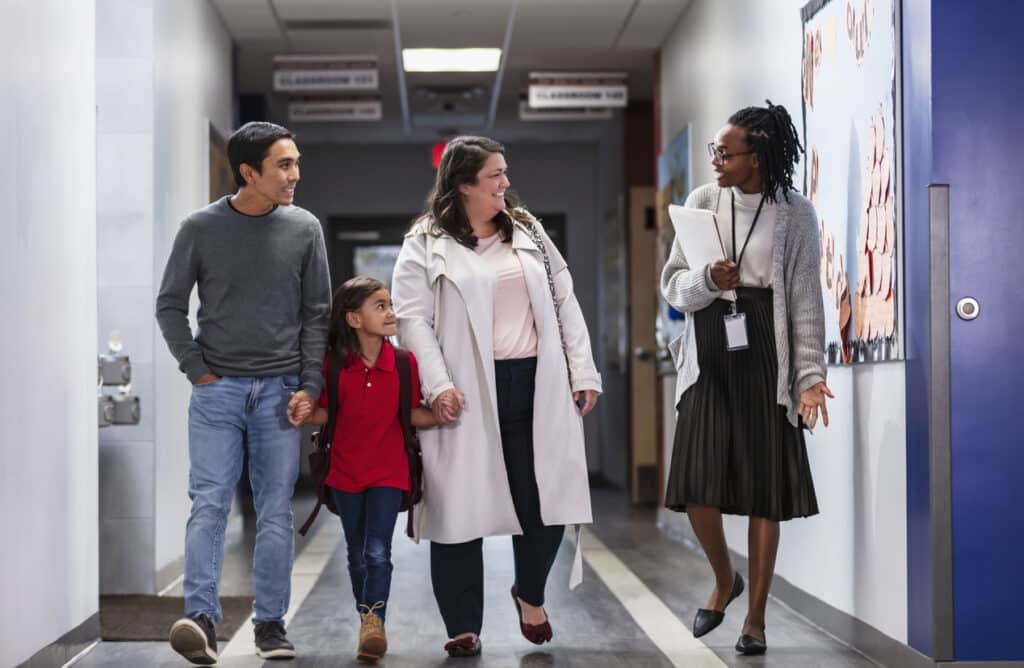Without a solid emotional support foundation for all students, schools often face more disruptions, declining academic performance, and higher teacher burnout.
This is especially true in Title 1 schools, where students may already be dealing with additional stressors like trauma and food insecurity. Failing to address mental health can intensify these challenges, making it even harder for students to succeed.
Tier 1 mental well-being strategies offer a proactive, school-wide approach to supporting all students, building a foundation for emotional resilience that helps prevent problems before they escalate. By focusing on prevention, early intervention, and positive reinforcement, these strategies create a healthy, supportive environment where both students and staff can flourish.
In our webinar, “Empowering Providers: Tier 1 Mental Wellbeing Training for Educational Enhancement,” Kay Kelly, Mental Health Clinical Services Specialist at eLuma, and Pola Morrison, experienced school psychologist and counselor, discussed practical approaches for creating a supportive classroom environment that fosters social-emotional learning (SEL) and resilience.
This article offers an in-depth look at Tier 1 well-being strategies mentioned in the webinar and why they are essential for cultivating a positive and successful school climate.
Understanding Tier 1 and Why It Matters
Tier 1 is the bedrock of any multi-tiered system of supports (MTSS), designed to serve every student in a school. According to the Positive Behavioral Interventions and Supports (PBIS) framework, Tier 1 systems, data, and practices provide universal support for all students focused on teaching, modeling, and reinforcing positive behaviors, social skills, and emotional regulation. By utilizing Tier 1 supports, schools can lay a strong foundation for preventing unwanted behaviors and fostering a positive school culture.
“Schools are the best way to reach and help children, but only about half of US public schools offer mental health assessments, and even fewer offer treatment services.” – Kay Kelly
Without a solid Tier 1 integration, schools risk facing more severe behavioral and academic challenges down the road. By prioritizing proactive support for all students, Tier 1 strategies prevent issues before they escalate, creating a safer and more supportive school environment.
Key Elements of Tier 1:
- Prevention: Proactively teaching emotional and behavioral skills to all students.
- Universal Support: Implementing school-wide systems that benefit every student, not just those with identified needs.
- Data-Driven Decisions: Regularly using data to monitor progress, make adjustments, and evaluate effectiveness.
Establishing Tier 1 practices ensures that your school builds a strong foundation for student success, fostering an environment where all students can thrive academically and emotionally.

The Impact of a Positive School Climate
When a school fails to create a positive climate, it leads to disengaged students, higher absenteeism, and increased behavioral problems. Research has shown that a positive school climate is linked to reduced teacher turnover, improved student engagement, and better academic outcomes (PBIS). A welcoming and supportive school climate is even more crucial in Title 1 schools, where external challenges and instability can affect students’ ability to engage with learning.
Creating a positive school climate is one of the most effective ways to set students up for success. When students feel safe, valued, and supported, they are more likely to engage in learning and seek help when needed. A positive climate helps students build the resilience they need to overcome personal and academic challenges, leading to better outcomes for everyone.
“A positive school climate, strong relationships, and social-emotional learning strategies are essential for fostering a supportive environment where students can thrive academically, socially, and emotionally.” – Kay Kelly
Where to Start:
- School Climate Surveys: These surveys gather feedback from students, staff, and families, helping to identify areas for improvement. They can uncover trends, such as where students feel disconnected or where additional staff support might be necessary.
- Universal Screeners: These tools help identify students who might need early intervention, ensuring no one is left behind. They play a crucial role in the MTSS framework, helping to address needs early and provide timely support (PBIS).
By using these tools, your school can proactively improve its climate, ensuring that students are supported and engaged in their academic journey.
Social-Emotional Learning: A Core Strategy for Success
SEL teaches students the skills they need to manage emotions, build positive relationships, and make responsible decisions. Without SEL, students may struggle to regulate their emotions, resolve conflicts, and connect with their peers, all of which can negatively affect their academic performance and social development. In fact, hundreds of studies involving more than 1 million Pre-K-12 students worldwide offer consistent evidence that SEL positively impacts students’ academic achievement and behavior.
SEL promotes emotional regulation, conflict resolution, and empathy—skills that are crucial for building positive, respectful school communities and improving academic outcomes.
“Building emotional literacy through language, positive affirmations, and conflict resolution skills helps students better express their emotions and regulate their feelings.” – Pola Morrison
By embedding SEL into your school culture using these strategies, you are providing students with the tools to navigate challenges both inside and outside the classroom:
- Mindfulness Exercises: Start each day with mindfulness activities to promote calmness and focus among students and staff.
- Emotional Check-Ins: Use daily check-ins to give students the opportunity to express how they are feeling, allowing teachers and counselors to identify those who may need extra support.
- Conflict Resolution Skills: Teach students how to navigate and resolve conflicts in a constructive way, promoting empathy and cooperation.
Some educators may face challenges communicating with parents about SEL and student behavior due to the stigma and politicized nature of the practice. When schools develop strong, trusting relationships with students and caregivers, it’s easier to have difficult conversations with student support systems in a light and uplifting way.

Relationships Are Crucial
Positive relationships are the foundation of a healthy school culture, helping students feel connected and supported. When schools fail to focus on building strong relationships between students, caregivers, and staff, they risk creating an environment of disengagement and distrust. Without these connections, students may feel isolated, increasing the likelihood of behavioral issues and disengagement.
“Schools are the constant in a student’s life—the routine, the place they spend a lot of time in—and the people they interact with during the day can make a pivotal difference.” – Pola Morrison
Students who feel they have trusted adults they can turn to for support are more likely to engage in their learning, seek help when needed, and overcome challenges. Building strong relationships helps foster a sense of belonging and ensures that every student feels seen, heard, and valued.
“Strong teacher-student relationships can help children show resilience in the face of difficult life circumstances, while low-quality relationships can be predictors of depression.” – Kay Kelly
Practical Steps to Foster Strong Student/Staff Relationships:
- Train All Staff Members: Equip all staff, from bus drivers to lunchroom workers, to model positive interactions and support students’ mental well-being.
- Helpful training topics may include:
- Storytelling and using books to foster social-emotional learning
- Active listening skills
- Movement and outdoor therapies
- Body language and vocal skills
- Stress management
- Helpful training topics may include:
- Provide Teachers with Empathy Tools: Give teachers resources to model empathy, encourage communication, and build trust with their students.
- Establish Mentorship Programs: Create opportunities for students to connect with caring adults who can provide guidance and emotional support throughout the year.
Classroom activities that foster relationships between students and teachers may include:
- Using a storytelling prompt to have students share “Ah ha!” moments.
- Going around the room to share one good thing about your day.
- Hosting a morning meeting or responsive classroom session focused on developing social-emotional skills.

Challenge The Stigma Every Day
Mental health should not be treated as a separate or special event but should be woven into the fabric of school life. This perspective aligns perfectly with Tier 1 practices, which emphasize proactive support for all students through consistent, school-wide efforts.
By integrating mental health support into daily routines, you normalize emotional well-being and ensure that it is prioritized across all settings:
- Incorporate Emotional Literacy: Make discussions about feelings a regular part of the curriculum, just as common as math or history lessons.
- Encourage Open Dialogue: Use activities like storytelling or group discussions to foster empathy and allow students to express themselves.
- Empower Students to Co-Create Classroom Norms: Involve students in creating classroom agreements that promote inclusivity and respect, helping them take ownership of their learning environment.
“A positive school climate, strong relationships, and social-emotional learning strategies are essential for fostering a supportive environment where students can thrive academically, socially, and emotionally.” – Kay Kelly
These practices create a school culture where mental health is an integrated part of every day, encouraging students to feel comfortable discussing their emotions and seeking support when needed. This work becomes even more effective when schools can bridge the gap between school and home, engaging caregivers in fostering the well-being of students, too.

How eLuma Can Help Your School Thrive
When it comes to implementing Tier 1 mental well-being strategies, schools need the right tools, training, and ongoing support to make these strategies effective. That’s where eLuma can help: we provide the resources and expertise needed to support your district in creating a school-wide environment that prioritizes mental health and emotional well-being.
eLuma offers a range of support solutions and training designed to equip your staff with the knowledge and skills to implement and sustain Tier 1 mental well-being practices. Our professional development opportunities ensure your team can effectively teach and model social, emotional, and behavioral skills for all students. Universal screeners offer a systematic way to identify students needing additional help to achieve their full potential. We also provide ongoing support and evaluation tools to monitor progress, adjust strategies, and ensure that your mental well-being initiatives are having the desired impact.
To learn more about how Tier 1 mental well-being strategies can transform your school, watch our on-demand webinar, “Empowering Providers: Tier 1 Mental Wellbeing Training for Educational Enhancement.” Hosted by Kay Kelly and Pola Morrison. This session offers valuable insights and practical strategies to improve your district’s approach to mental well-being.
Ready to take the next step? Contact eLuma today to learn how we can help you implement Tier 1 mental well-being strategies and support your district’s goals. Together, we can create a blueprint for success that meets the needs of your students, staff, and budget. Let’s make mental well-being a cornerstone of every school’s success.
Meet The Experts

Pola Morrison, MS, LSP
Pola Morrison, MS, LSP, brings over 25 years of experience as a dedicated school psychologist and counselor, working to support students’ academic, emotional, and behavioral success within the K-12 system as well as support services for adults with disabilities at the university level.

Kay Kelly, Ed.S.
Kay, Mental Health Clinical Services Specialist at eLuma, has 15 years of experience as a school psychologist in the public education system, supporting students in early childhood through age 21. She is also experienced in diagnostic assessment, crisis response, intervention, and advocacy.


